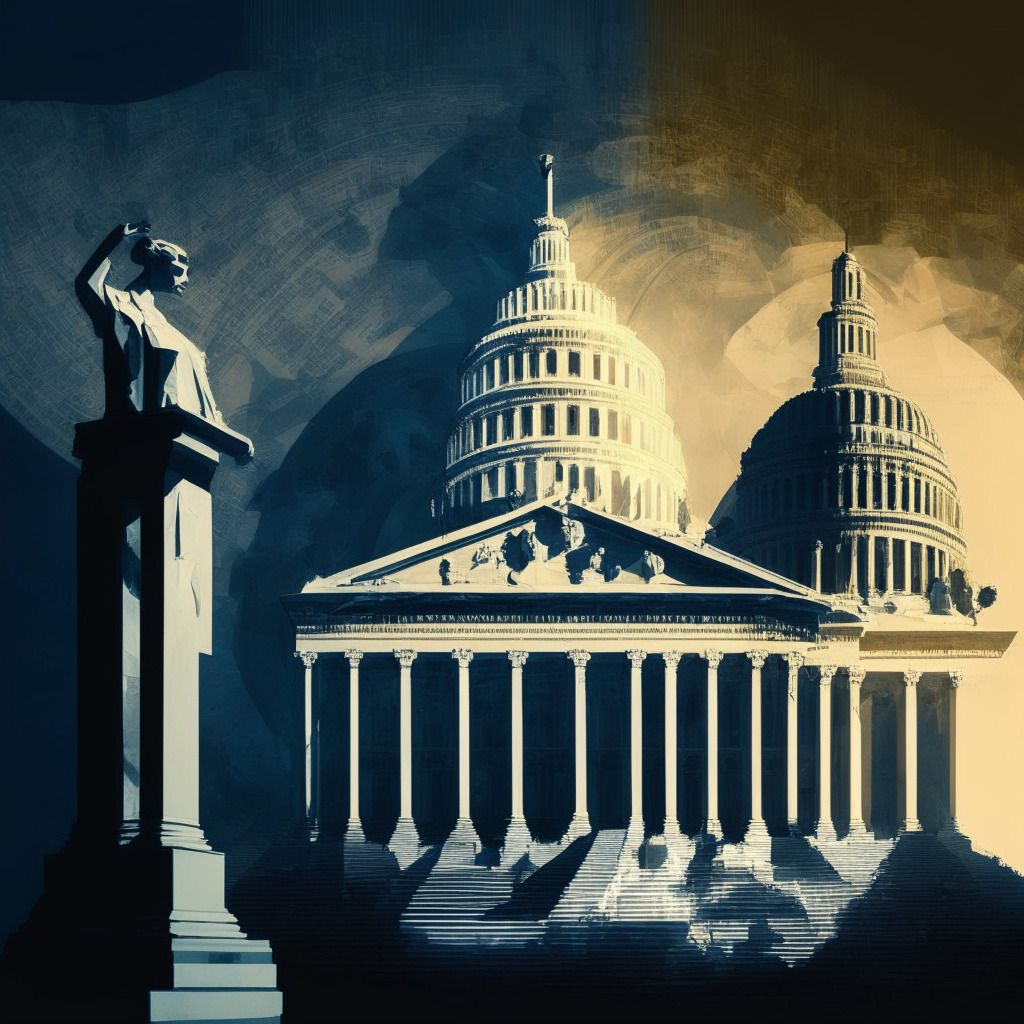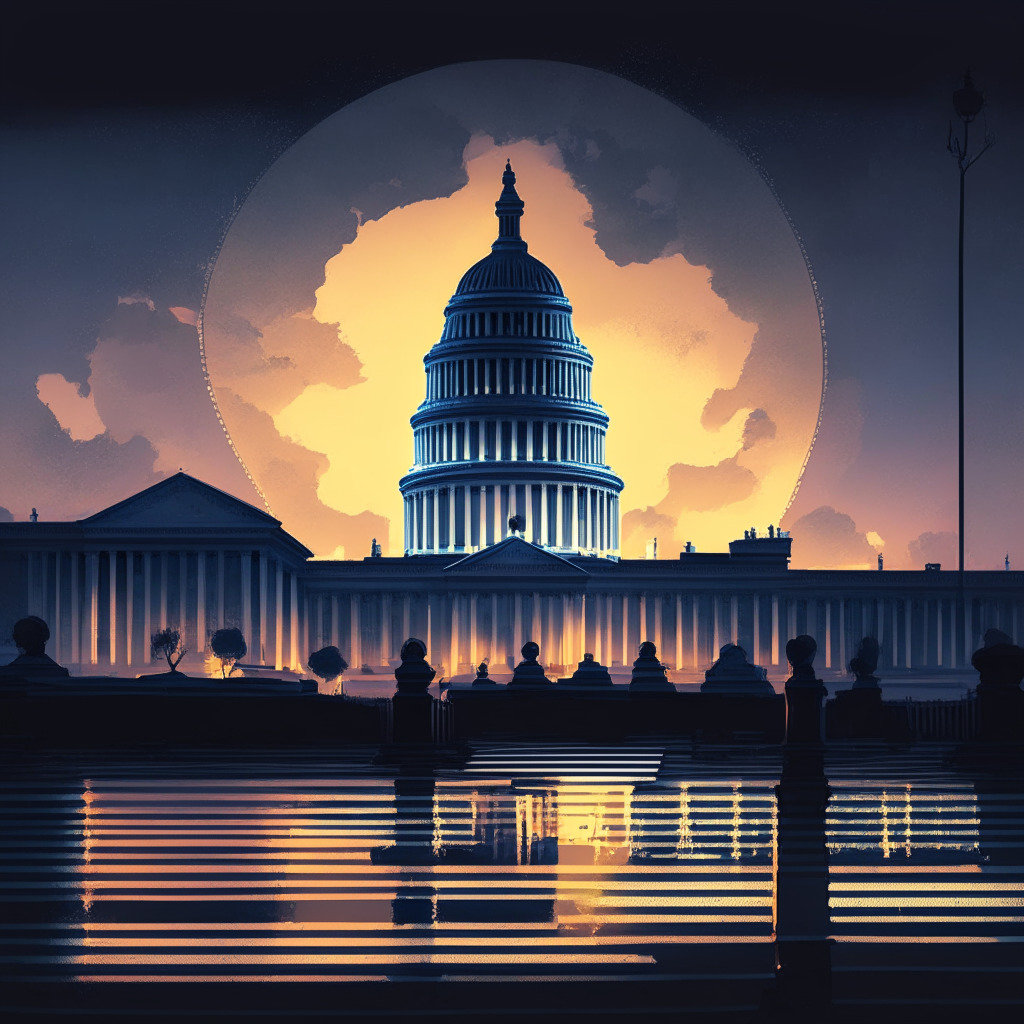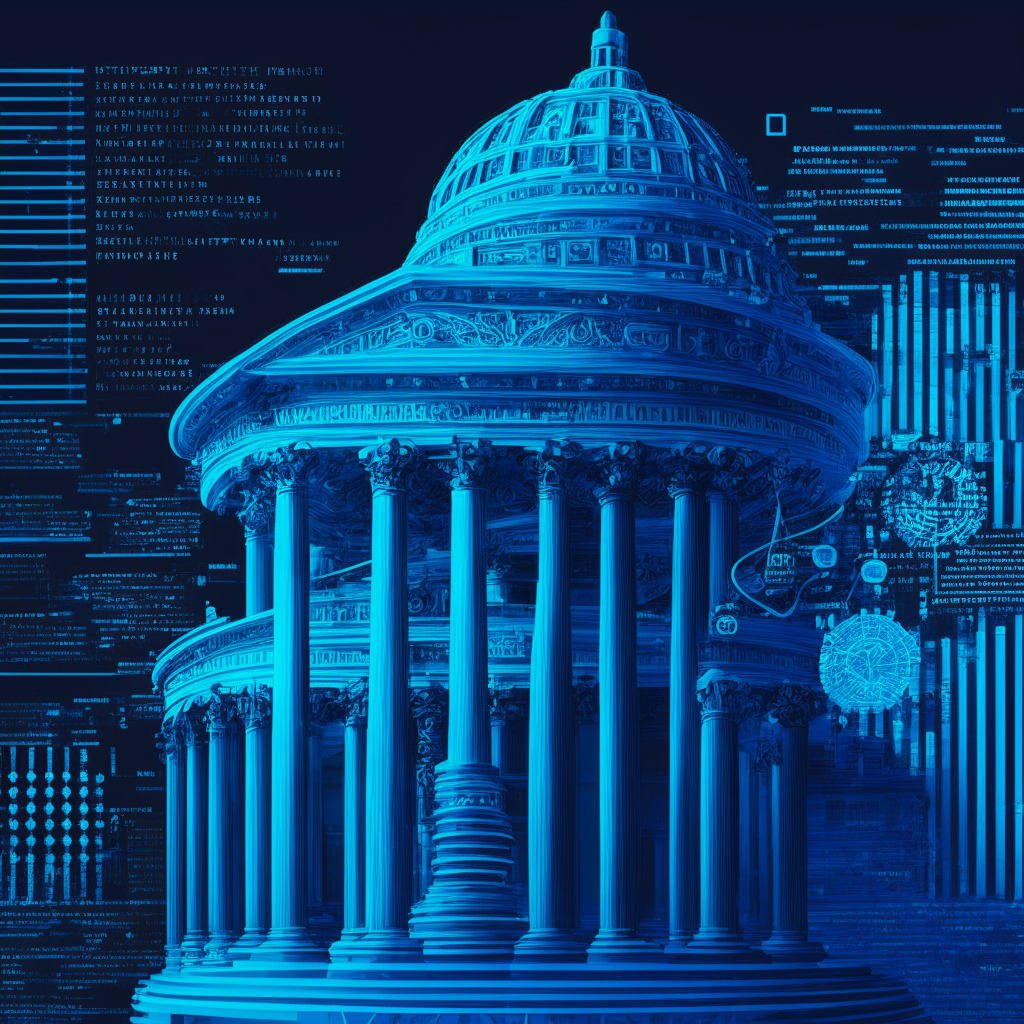In a recent House Energy and Commerce Committee Subcommittee meeting, Polygon Labs’ Ryan Wyatt discussed the potential of blockchain technology in creating a decentralized, transparent Web3, benefiting users and driving economic growth. He emphasized the need for a well-regulated blockchain ecosystem in the US to maintain competitiveness and ensure domestic technology industry thrives.
Search Results for: U.S. Congress
Title: Crypto Clash in Congress: U.S. House Committees to Embark on Unprecedented Joint Hearings for Digital Assets Regulation
The U.S. House of Representatives is taking major strides towards addressing digital asset regulations as […]
The Lure and Perils of Imminent Ethereum Futures ETFs Launch Amid U.S. Shutdown Fears
Bloomberg analysts predict the launch of Ethereum futures exchange-traded funds (ETFs) in the US, possibly accelerated by a potential government shutdown. The SEC might permit various Ethereum futures ETFs to launch next week. Despite previous failed attempts, analysts give a 90% chance of launching this October, but regulatory complexities and uncertainties remain a concern in the crypto market.
Battleground CBDC: A Bipartisan Struggle Shaping Cryptocurrency’s Future in the U.S.
The House Financial Services Committee introduced three bills halting the Federal Reserve’s considerations towards a Central Bank Digital Currency (CBDC). Republicans expressed fears over the potential impact on traditional banking and the suspense it could cast on the stablecoin market. Democrats, however, pushed for continued CBDC exploration, reminding of its potential benefits in global economic competition. The Federal Reserve reaffirmed its cautious approach towards CBDC, emphasizing concerns over a stablecoin issuance without federal control.
The Tug of War: The U.S.’s Potential Leap into Digital Currency vs Fears of Surveillance
The U.S. House of Representatives is considering the introduction of a Central Bank Digital Currency (CBDC), amidst contrasting views. Democrat Rep. Stephen Lynch calls for a pilot project for a digital dollar, stressing it is “absolutely critical” for the U.S. to show leadership in digital currency development. However, concerns remain regarding transaction management, tracking, and potential regulatory limitation issues.
Coinbase Achives Unprecedented U.S. Regulatory Milestone: Boom or Bust for Crypto Industry?
The U.S. Commodity Futures Trading Commission (CFTC) has granted Coinbase unprecedented authority to handle bitcoin and ether futures, marking it as the first crypto company to receive registration as a futures commission merchant. This significant development indicates robust systems for capital, disclosures, record-keeping, and customer fund segregation, and it might influence how ether and similar commodities navigate the U.S. regulatory regime. However, concerns arise about potential market manipulation and the impact on other crypto-native companies.
Navigating Uncertainty: Progress and Hurdles in the U.S. Crypto Regulation Landscape
“Crypto enthusiasts are celebrating progress toward a new U.S. oversight system for digital assets despite uncertainties. The development involves digital assets legislation addressing regulation framework, stablecoins, and crypto-related money laundering. The law guiding crypto operations leaped over two House committees, indicating progress in U.S. crypto regulation.”
U.S. Crypto Regulation: Balancing Innovation and Compliance in the Blockchain Era
“The U.S Congress moved closer to regulatory clarity with two crypto-related bills: the Financial Innovation and Technology for the 21st Century Act, aimed at crypto company registrations, and the Blockchain Regulatory Certainty Act, aiming to cut down barriers for blockchain developers. However, potential conflicts between lawmakers and industry operators may lead to strenuous compliance requirements, possibly bringing the crypto industry closer to traditional finance rules and limitations.”
Sweeping U.S. Regulatory Acts: Crypto Advancement or Investor Risk?
The House Financial Services Committee approves a bipartisan bill, Financial Innovation and Technology for the 21st Century Act, aiming to provide regulatory clarity for cryptocurrencies. The Act delineates registration requirements for crypto firms and seeks to define if a cryptocurrency is a security or a commodity, extending the CFTC’s control over the crypto industry.
Roadmap to Regulations: Unveiling the U.S. Senators’ Bill for Comprehensive Crypto Laws
U.S. Senators Cynthia Lummis and Kirsten Gillibrand unveiled a revised draft for comprehensive crypto regulation, marking an evolution from a previous draft penned a year ago. The bill addresses decentralized finance definition, anti-money laundering provisions, custody rules and grants the CFTC decisive control over crypto issuers, alongside defining roles for the SEC.
Legal Limbo: Examining the Ripple Case and its Impact on U.S. Cryptocurrency Regulation
Recently, judge Analisa Torres delivered a split decision in SEC v. Ripple Labs, implying legal ambiguity surrounding cryptocurrency tokens. She supported Ripple’s sales of tokens on asset exchanges while contesting institutional sales. This inconsistency leads to uncertainty in the crypto market, which can only be addressed by Congress stepping in to establish standardized regulations.
AI in Congress: Striking Balance Between Privacy & Innovation in Legislative Process
The U.S. House of Representatives has limited the use of OpenAI’s ChatGPT to ensure privacy preservation, authorizing only the ChatGPT Plus version under specific conditions. As AI technology advances, striking a balance between AI-driven innovations and privacy protection becomes crucial. Establishing a regulatory framework for AI applications is necessary to support its transformative potential without compromising privacy.
U.S. Crypto Industry: A Bitcoin-Focused Future Amid Regulatory Shifts
Michael Saylor believes the US crypto industry is poised for a “Bitcoin-focused” future due to regulatory enforcement actions. He claims that regulatory clarity will drive Bitcoin adoption by eliminating confusion and anxiety for institutional investors and predicts Bitcoin’s long-term dominance rising above 80% of the total crypto market.
Crypto Titans and Regulators to Debate New Bill in Congress: Impact on US Innovation
Coinbase, Robinhood, and US commodities regulator representatives will testify before Congress on June 6 regarding a proposed crypto bill. The bill aims to classify certain crypto tokens as digital commodities and provide a clearer regulatory framework. Coinbase Chief Legal Officer Paul Grewal emphasized its importance for protecting consumers and fostering crypto innovation in the US.
U.S. Crypto Regulation: Balancing Innovation and Public Safety to Ensure Global Leadership
The U.S. Chamber of Digital Commerce is urging Congress to prioritize a national approach to crypto regulation, warning that the lack of proper legal frameworks may result in the nation falling behind in the rapidly evolving blockchain space. Implementation of a unified strategy could bolster U.S. leadership, promote innovation, and address potential risks.
SEC & Congress Clash: Crypto Platforms Registration, Balancing Regulation & Innovation
The SEC faces challenges in crafting digital asset regulations that protect investors without stifling innovation. Lawmakers express frustration over the regulatory body’s lack of clarity, while the future role of the SEC and Congress in shaping crypto regulations remains uncertain.
AI Regulation Debate: Halt in Development or Prioritize Ethics? Congress to Decide
A congressional hearing on AI oversight featuring prominent figures like OpenAI CEO Sam Altman, IBM’s Christina Montgomery, and NYU’s Gary Marcus will discuss potential regulations and address safety and privacy concerns. As AI regulation debates continue, the impact on industries like fintech, cryptocurrency, and ethical AI development remains uncertain.
Congressmen Challenge CEA’s Crypto Stance: Innovation vs Consumer Protection Debate
U.S. Congressmen Warren Davidson and Mike Flood express concerns over the Council of Economic Advisers’ negative stance on digital assets, arguing it may displace innovation and economic growth. They advocate for a regulatory framework supporting innovation while maintaining essential protections and question the dismissal of digital asset benefits in the recent Economic Report of the President.
Crypto Countdown: Congress Aims for Legislative Leap in 2 Months or Less – Buckle Up, Biden!
Crypto Countdown: U.S. Congress Aims for Legislative Leap in 2 Months or Less – Buckle […]
Unleashing the Crypto Future: An Analysis of the FIT Act and its Impact on the Digital Asset Space
“The FIT Act marks the premiere of crypto-focused legislative efforts gaining traction in U.S. Congress. This signals mutual agreement about the significance of the digital assets sector, addressing the inadequacy of the current regulatory system, and fostering innovation. Policymakers are establishing a suitable framework for the rapidly evolving crypto industry.”
AI Licenses: Striking a Balance Between Innovation and Safety in the Crypto World
OpenAI CEO Sam Altman testifies before U.S. Congress, advocating for AI regulation requiring safety standard compliance and system testing. However, concerns arise over potential over-regulation stifling innovation in the AI and crypto industries.
Coinbase vs SEC: Unfolding Regulatory Tensions and the Future of Blockchain Technology
“While Congress actively drafts cryptocurrency regulations, the SEC persists on its own path, complicating the regulatory landscape. This raises questions regarding the SEC’s authority over digital assets. Recent losses to Ripple and Grayscale intensify the need for regulatory clarity, underlining the SEC’s inconsistencies in classifying cryptocurrencies.”
Coinbase Set to Acquire Minority Stake in Circle amidst USD Coin Developments
Coinbase is reportedly purchasing a minority stake in Circle Internet Financial, which coincides with Circle bringing the issuance of the USD Coin entirely in-house. Additionally, six more blockchains are to be integrated with USDC. This move comes amidst increasing competition and regulations within the stablecoin environment.
Cryptocurrency: The Supremacy Race Between U.S and China in the Blockchain Era
In the current era of technological renaissance, the U.S. struggles to keep up with blockchain technology, while China continues to make significant progress with its central bank digital currency. Binance, reportedly handling a majority of global crypto trading volume, faces legal challenges in the U.S. amidst a larger climate of legal obscurity in the crypto industry.
Crypto Crusade: Blockchain Advocate’s Bid for Texas House and Wider Implications for Crypto Politics
“Steven Kinard, director of Bitcoin mining analytics at the Texas Blockchain Council, plans to run for the Texas House of Representatives. Advocating for digital freedom and strategic tech investments, he expresses concerns over the U.S. Federal Reserve’s attempts to introduce a CBDC. As the 2024 elections approach, the role of crypto regulation in legislative agendas holds prominence.”
CFTC’s Upcoming Decision on KalshiEX: A Turning Point for Crypto-Based Prediction Markets?
The CFTC’s upcoming decision on KalshiEX’s binary contracts has crypto enthusiasts on edge, as its approval or rejection could impact the future of crypto-based prediction markets. While offering efficient price discovery and valuable insights, concerns about market manipulation and inherent risk exist.
SEC vs Terraform Lawsuit: Dismissal Debate and Crypto Asset Classification Battle
The SEC disputes Terraform and Do Kwon’s motion to dismiss their lawsuit, arguing that the defense’s documents don’t support dismissal. Dentons, representing the defendants, insists USTC isn’t a security and highlights the regulatory gap in crypto asset classifications. A decision on the motion is expected by July 14th.
SEC Stabilization Act: Restructuring SEC and Crypto Regulation Controversy Unfolds
Republican congressmen Warren Davidson and Tom Emmer have filed the SEC Stabilization Act, aiming to restructure the SEC and remove Chairman Gary Gensler, citing concerns over his governance of the crypto market. The legislation seeks to provide clearer and more consistent oversight for American investors and the crypto industry, amid concerns of a detrimental impact on the market and potential migration of the industry overseas.
SEC vs. Coinbase: The Battle for Crypto Regulation Clarity and Its Impact on the Future
A U.S. court orders the SEC to clarify its stance on crypto exchange Coinbase’s rulemaking petition within seven days, amidst escalating legal battles. The ongoing conflict highlights the need for clear regulations within the growing cryptocurrency industry to protect investors while fostering innovation and growth.
Draft Bill May Reshape Crypto Regulation: Pros, Cons, and Main Conflict
Senior House Republicans introduced a draft bill aiming to establish a concise framework for digital assets in the U.S., allowing regulated crypto firms to argue for commodity classification. The legislation would also introduce digital commodity exchanges with oversight by the Commodity Futures Trading Commission. However, it currently lacks support from Democrats and faces challenges in achieving consensus.
Debt Ceiling Agreement Blocks Crypto Mining Tax: A Win for the Industry or Environmental Setback?
The recent U.S. debt ceiling agreement has notably blocked the proposed Digital Asset Mining Energy (DAME) excise tax, preventing a 30% tax imposition on cryptocurrency mining firms. This outcome, seen as a victory for the crypto industry, has sparked debates around the environmental impact of crypto mining operations and the importance of addressing energy consumption concerns for a sustainable future.
US Debt Crisis Looming: Implications, Pros & Cons for Crypto Market and Bitcoin
The U.S. government faces a “significant risk” of not meeting its financial obligations by June due to a $31.4 trillion debt limit, potentially impacting the crypto market as investors seek alternative assets like Bitcoin. However, concerns about market volatility and regulation may deter some investors.































